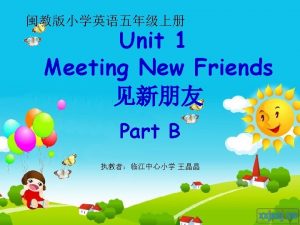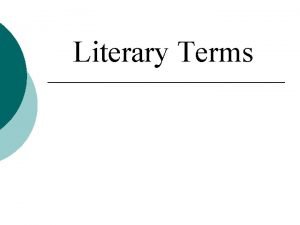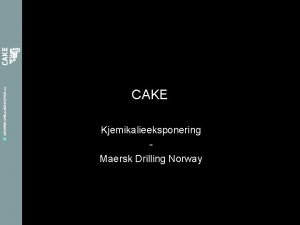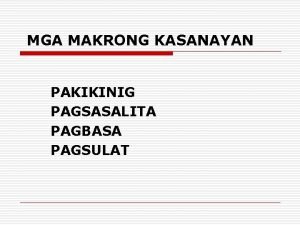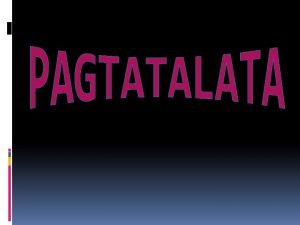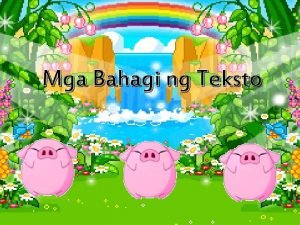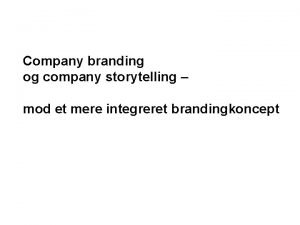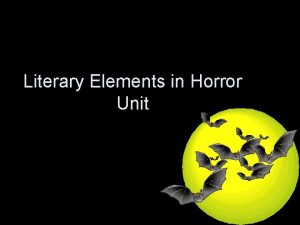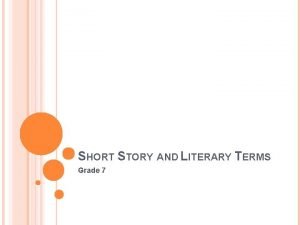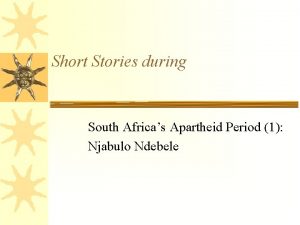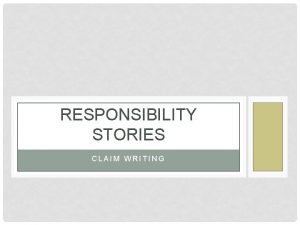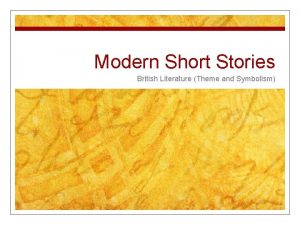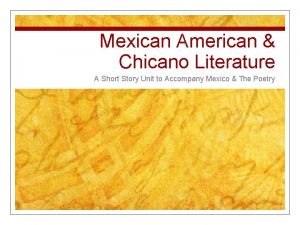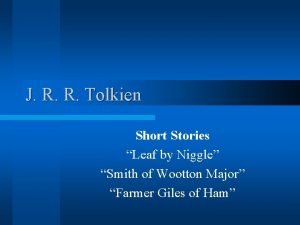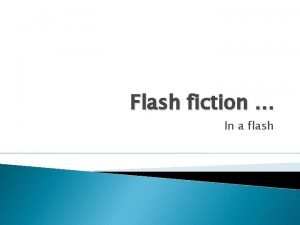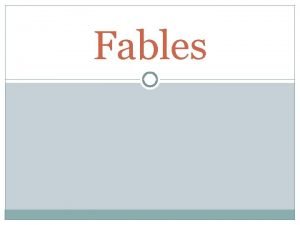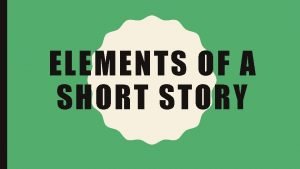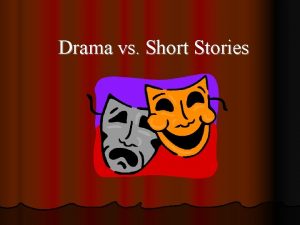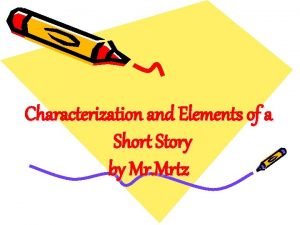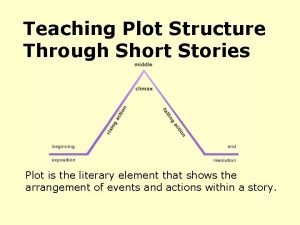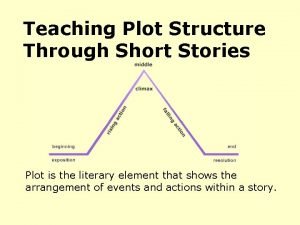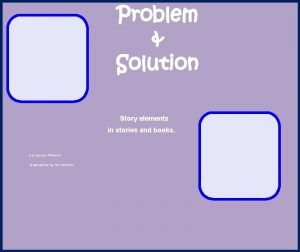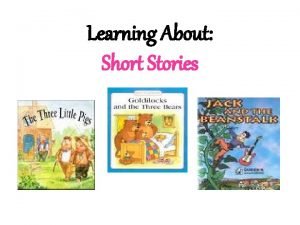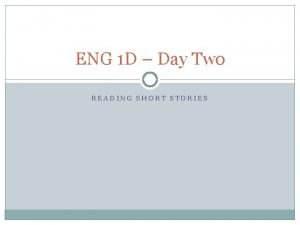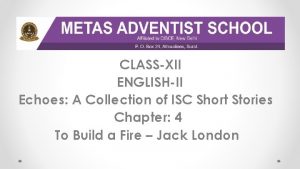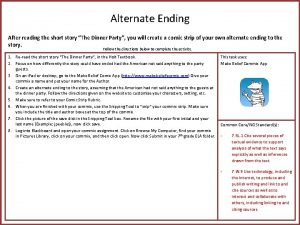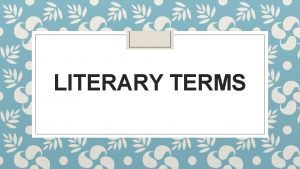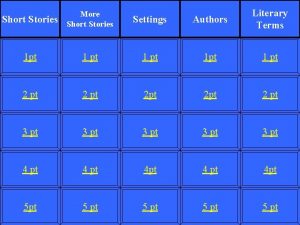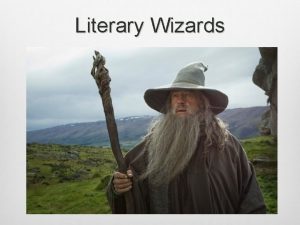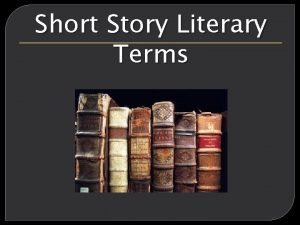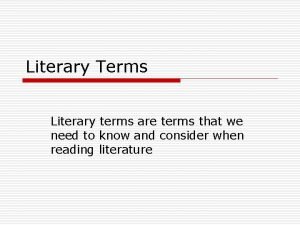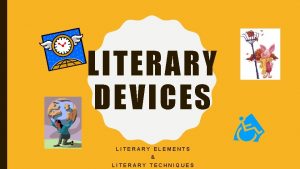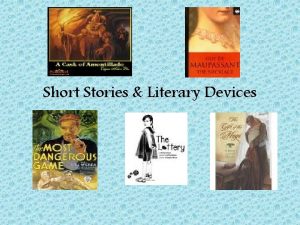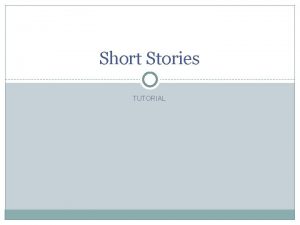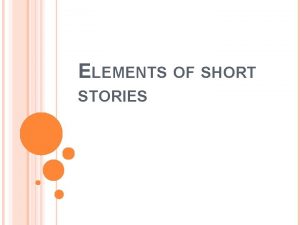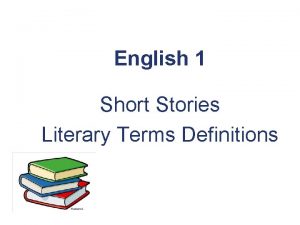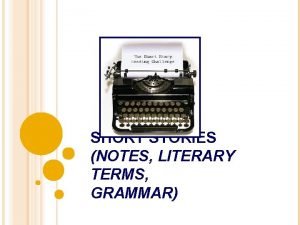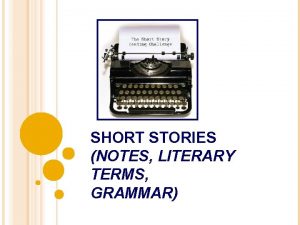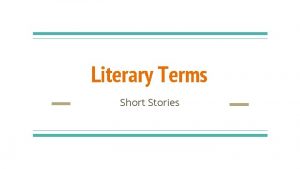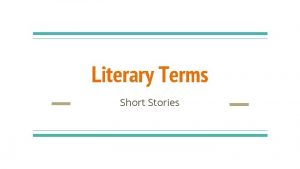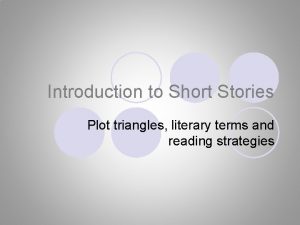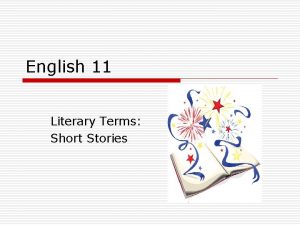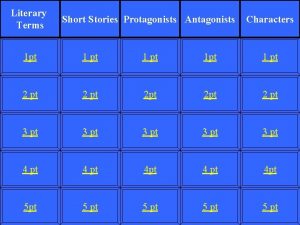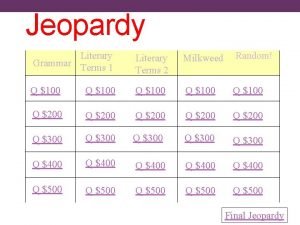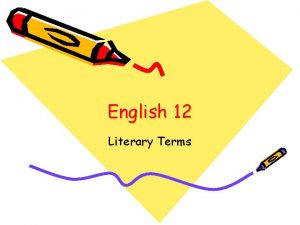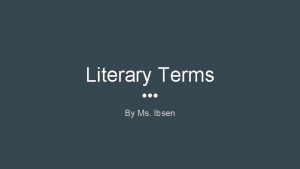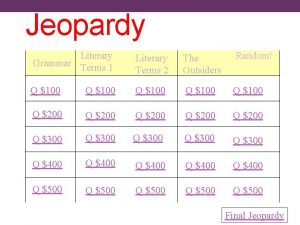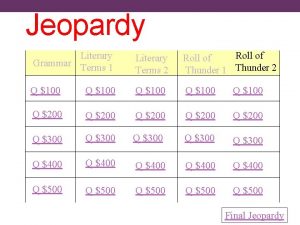Literary Terms for Short Stories RW 6 Maling
































- Slides: 32

Literary Terms for Short Stories RW 6 Maling Lew

Part I 1. 2. 3. 4. 5. 6. Metaphor Simile Alliteration Personification Hyperbole Irony

Metaphor • Comparing two things together that may at first seem dissimilar • Uses: A is B • Examples: A B – His words were poison. – She is a rock. – Life is a race. – No man island.

Choose one: • • • Love Death Dating Teachers Students Words / language Life Failure Americans • • Mothers Fathers Babies / children Teenagers Traffic Reading Books • Your own word….

Class Metaphors • • Time is a sword. Love is gold. Children are animals. Love is war. Love is a trap. Marriage is a grave. Life is a maze. Books are oceans.

Simile • Comparing two things together that may at first seem dissimilar • Uses: A like / as B • Examples: – She is as cold as ice. – I am busy as a bee. – Her eyes are like diamonds. – Life is like a box of chocolates.

Class Similes • Lets party like there is no tomorrow. • Teachers are like candles. They burn themselves to give us light. • Students are like sponges. They soak up knowledge. • Dating is like a competition. • California is hot as an oven • Schools are like jails. • Work for tomorrow as you live for ever. • He works as a clock.

Alliteration • Repetition of initial sounds in a series of words • Examples: It was a snowy, silver, splendid scene. Katie is cute as a kitten. Karl was quick as a cat. Alice's aunt always ate apples around August.

Class Alliterations • Maling might make an appointment for a massage on Monday. • Can Crody can a can like a canner can a can? • Thomas told Tom to tolerate Tony. • Song sees a spring during spring. • Lan likes living in a lovely land. • Yuki often yelled at young Yukie in youthful years. • Jeff just got justification from Jesus. • Lulu looks at the lock to see if the lock was/is locked.

Personification • Giving human qualities to things that are not human – The leaves danced in the wind. – The old house appeared depressed. – She did not realize that death was knocking at her door.

Personification examples • The cold winter took her frail life. • Death is watching you while you are smoking. • The wind gives you a hand when you are running. • The phone ran away from my hands. • Time slipped away. • The tornado sacked the city. • The flower is smiling at me. • Luck always fights me.

Hyperbole • An overstatement or exaggeration Examples: • I left you a thousand messages. • I am so hungry I could eat a horse. • I have a million things to do. • I have a ton of homework. • If I can’t buy that new car, I will die.

Class Hyperboles • • I’m so tired / happy / angry / … I could …. I’m so tired that I could sleep for days. I’m so happy I could fly! I’m so mad that I could kill someone.

Irony • Irony is the opposite of what is expected • Irony requires an opposing meaning between what’s said and what’s intended Examples: -The Olympic swimmer drowned in the bath. -An old man who wins the lottery dies the next day. -You are surrounded by ocean water, but you can’t drink any of it.

Example of Irony • Life of Brian – Monty Python movie clip • https: //www. youtube. com/watch? v=Qere. R 0 CVi MY • Brian = a man born on the same day as Jesus Christ, next door, many people follow him • What the crowd says is opposite from what they are doing. • The one man who says, “I’m not [different]!” is actually showing that he IS DIFFERENT.

Class Examples of Irony • • It’s a free ride when you are already there. An ape fell from a tree. A freeway that is not free. A dog escaped from the cat.

Part II Check with a partner how many terms you already know. Short Story Plot Exposition Conflict Climax Resolution /Denouement Character Theme Setting Style Tone Symbol

Short Story • A fictional narrative generally centering on one climactic event and usually developing only a single character in depth • Its scope is narrower than that of a novel. Ex: Cinderella

Setting the historical, physical, geographical, and psychological location where a fictional work takes place: place and time. • Ex: far away land, many years ago

Character A fictional representation of a person (or animal). • Protagonist – The main character – Ex: Cinderella • Antagonist– The opponent of the protagonist. The antagonist may be a person, nature, or society. – Ex: Stepmother and stepsisters

Point of view (P. O. V. ) The angle from which a story is told; i. e. , the type of narrator the author chooses to use • first-person narration • the narrator uses "I" to tell his or her story • third-person narration • narrators are not actually characters in the story • Narrator uses “he, she, they”

Plot • The way in which the events of the story are arranged. • Beginning Middle End – Exposition = background, set-up – Rising action = conflict, problem, crisis – Climax = highest point of tension – Falling action = how things work out – Resolution = result, ending

Conflict (problem)


Conflict (problem) • Cinderella wants to attend a ball but her stepmother prevents her from going. • Fairy godmother appears, gives her dress and shoes. • Cinderella goes to the ball, meets the Prince. • She runs away at midnight. • Shoe falls off.



Theme the central or dominant idea of the whole story • Ex: True love always wins • Ex: Good always wins over evil • Ex: If you do something in secret, it will be made public eventually

Style the way a writer selects and arranges words to express ideas Is the language very. . . • Direct / Indirect • Long / short sentences, descriptions • Realistic / imaginative

Tone the attitude of the speaker or author of a work toward the subject matter • + positive, hopeful • 0 neutral • - negative, sarcastic

Symbol Anything that stands for something else, often a thing that stands for an idea. • a red rose – love • broken mirror – bad luck • a calm lake – peace

“An Appointment in Samarra” Based on the short story, discuss the following literary terms. – Plot – POV – Characters (Antagonist and Protagonist) – Theme – Setting – Style – Tone – Irony
 Tall + short h
Tall + short h Short story in literary terms
Short story in literary terms Hvad er oee
Hvad er oee Mærsk maling
Mærsk maling Uri ng pagbasa critical reading
Uri ng pagbasa critical reading Maikling talata example
Maikling talata example Mabilis sa paglalagom ng mga ideya
Mabilis sa paglalagom ng mga ideya Corporate image måling
Corporate image måling Literary devices in horror stories
Literary devices in horror stories Short story definition
Short story definition Grade 7 story
Grade 7 story Short stories about apartheid
Short stories about apartheid Story about responsibility
Story about responsibility British literature short stories
British literature short stories Mexican short stories
Mexican short stories Main idea short stories
Main idea short stories Tolkien short stories
Tolkien short stories Barney'' by will stanton analysis
Barney'' by will stanton analysis Currents hannah bottomy
Currents hannah bottomy Short fables with morals
Short fables with morals Moral of the story definition
Moral of the story definition Difference between drama and short story
Difference between drama and short story Short story characterization
Short story characterization What is a short story in literature
What is a short story in literature Shrek falling action
Shrek falling action Short story plot structure
Short story plot structure Problem and solution short stories
Problem and solution short stories Short story essential questions
Short story essential questions Short story grade 10
Short story grade 10 Eng1d short stories
Eng1d short stories To build a fire isc
To build a fire isc Short stories with alternate endings
Short stories with alternate endings World literature short stories
World literature short stories
